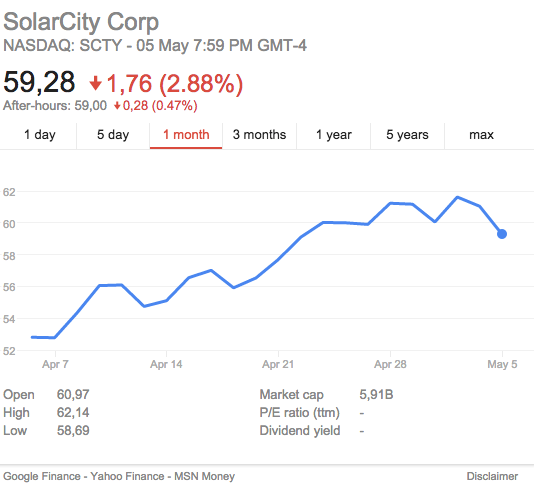
(Bloomberg) — SolarCity Corp., the biggest U.S. residential solar installer, posted a smaller first-quarter loss after surging demand for rooftop power plants helped the company beat its own installation forecast.
The net loss narrowed to $21.5 million, or 22 cents a share, from $24.1 million, or 26 cents, a year earlier, San Mateo, California-based SolarCity said Tuesday in a statement. Excluding some items, the company lost $1.52 a share, the most since its December 2012 initial public offering and less than the $1.66 average of eight analysts’ estimates compiled by Bloomberg.
SolarCity is pushing into a variety of new areas, turning the company into a diverse supplier of energy rather than one focused mainly on rooftop power systems. That includes offering storage systems developed by Tesla Motors Inc. and microgrids for remote communities. Chief Technology Officer Peter Rive said declining battery costs will make these new technologies more common.
“Solar battery systems will be in all our new installations in five years,” Rive said on a conference call with analysts Tuesday. “We’re seeing strong growth in demand from industrial customers.”
‘New Era’
By generating and storing power close to where it’s needed, “we will be able, for the first time, to make the clean energy we produce available on demand,” Chief Executive Officer Lyndon Rive said in a letter to shareholders Tuesday. “The advent of cost-effective storage combined with solar has the potential to usher in a new era for energy.”

SolarCity installed 153 megawatts of panels in the quarter, up from 82 megawatts a year earlier, beating the company’s February forecast of 145 megawatts. Sales rose to $67.5 million from $63.5 million.
The company continues to pour revenue into installing more energy systems, and it’s not likely to report a profit anytime soon, said Ben Kallo, an analyst at Robert W. Baird & Co. in San Francisco.
SolarCity “is a long-term cash flow story, not a near-term profitability story,” Kallo wrote in a research note Monday. He downgraded the shares to neutral from buy on concerns that utility regulators may make rooftop solar installations less attractive to consumers, while a new valuation method for the company’s long-term leases may confuse investors.
For the second quarter, SolarCity expects to install 180 megawatts of solar power systems, generating total revenue of $86 million to $92 million and a loss excluding some items of $1.60 to $1.70 a share. The company reaffirmed its full-year forecast of adding 920 megawatts to 1,000 megawatts of solar systems, roughly double the 502 megawatts installed in 2014. Excluding some items, that would lead to a loss of $1.65 to $1.75 a share in 2015.
“At the growth rate we are on, every dollar we take in is plowed right back into development,” Chief Financial Officer Brad Buss said on the call.

